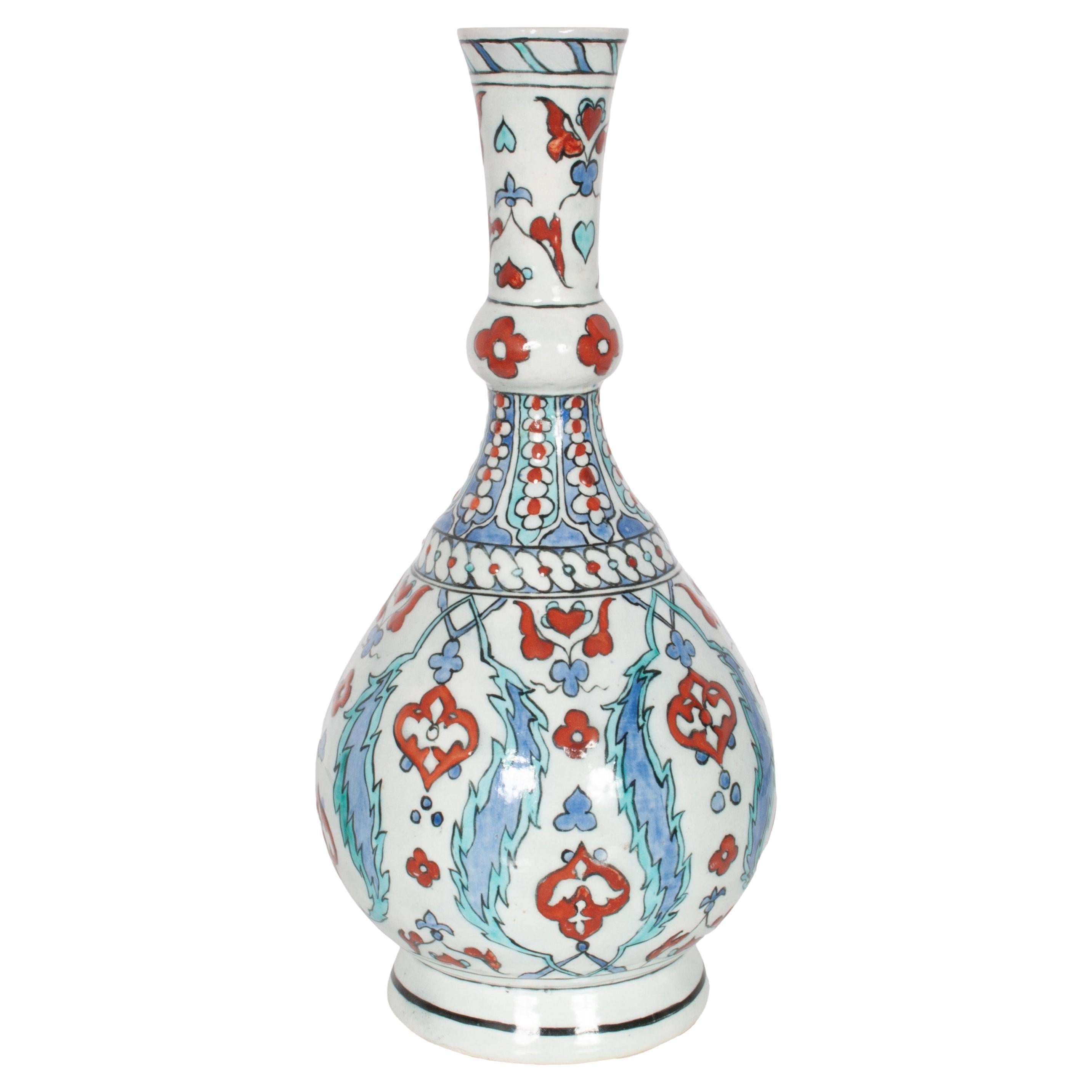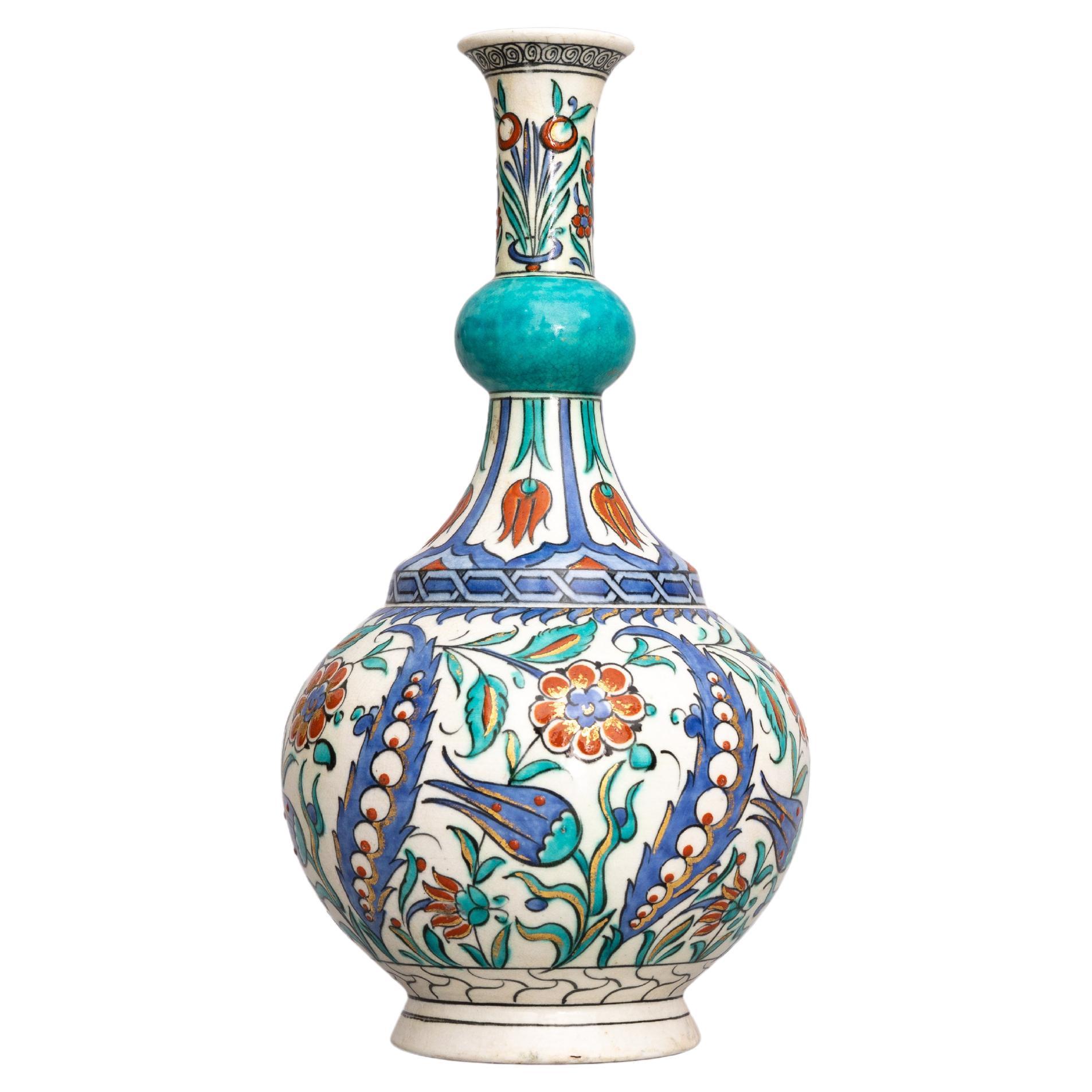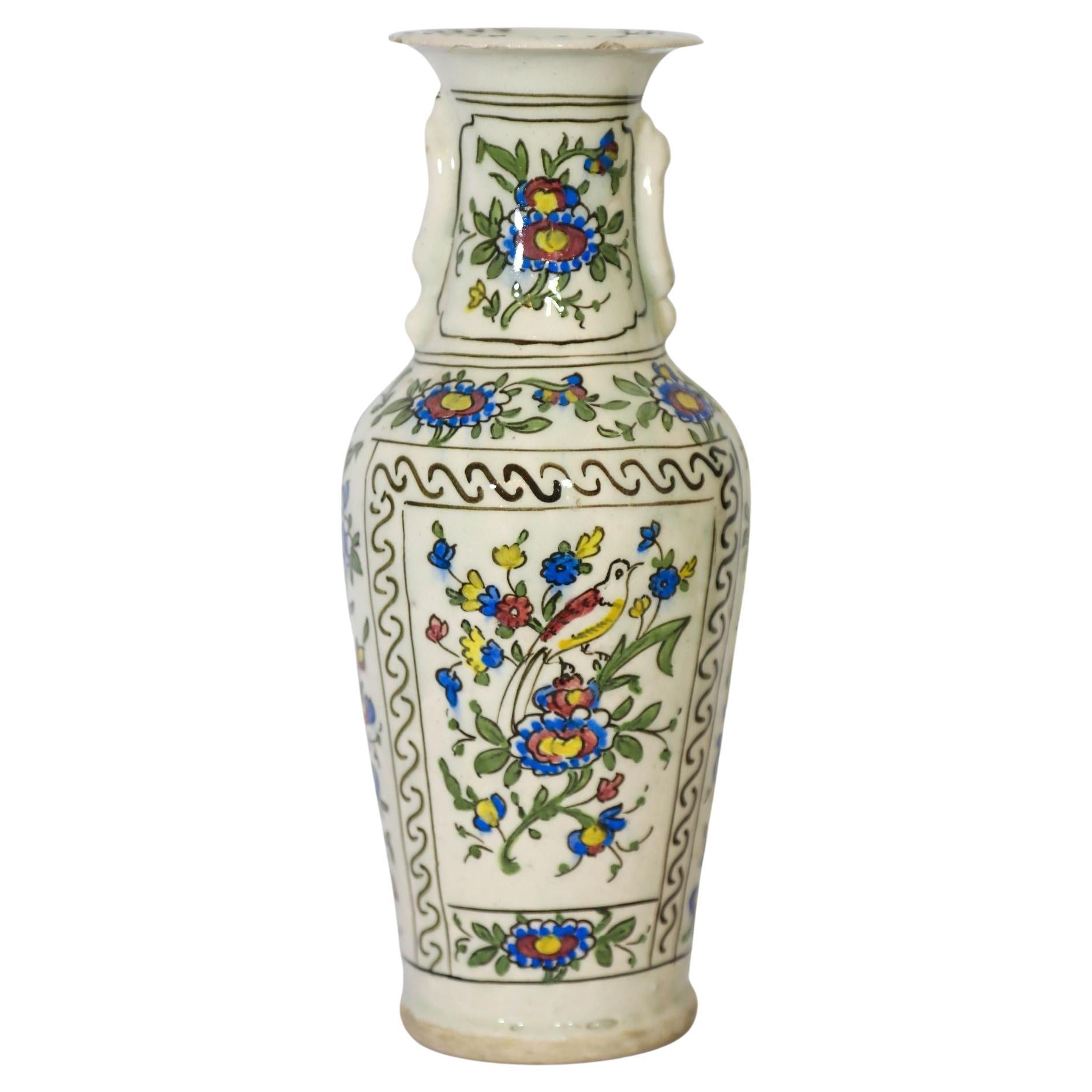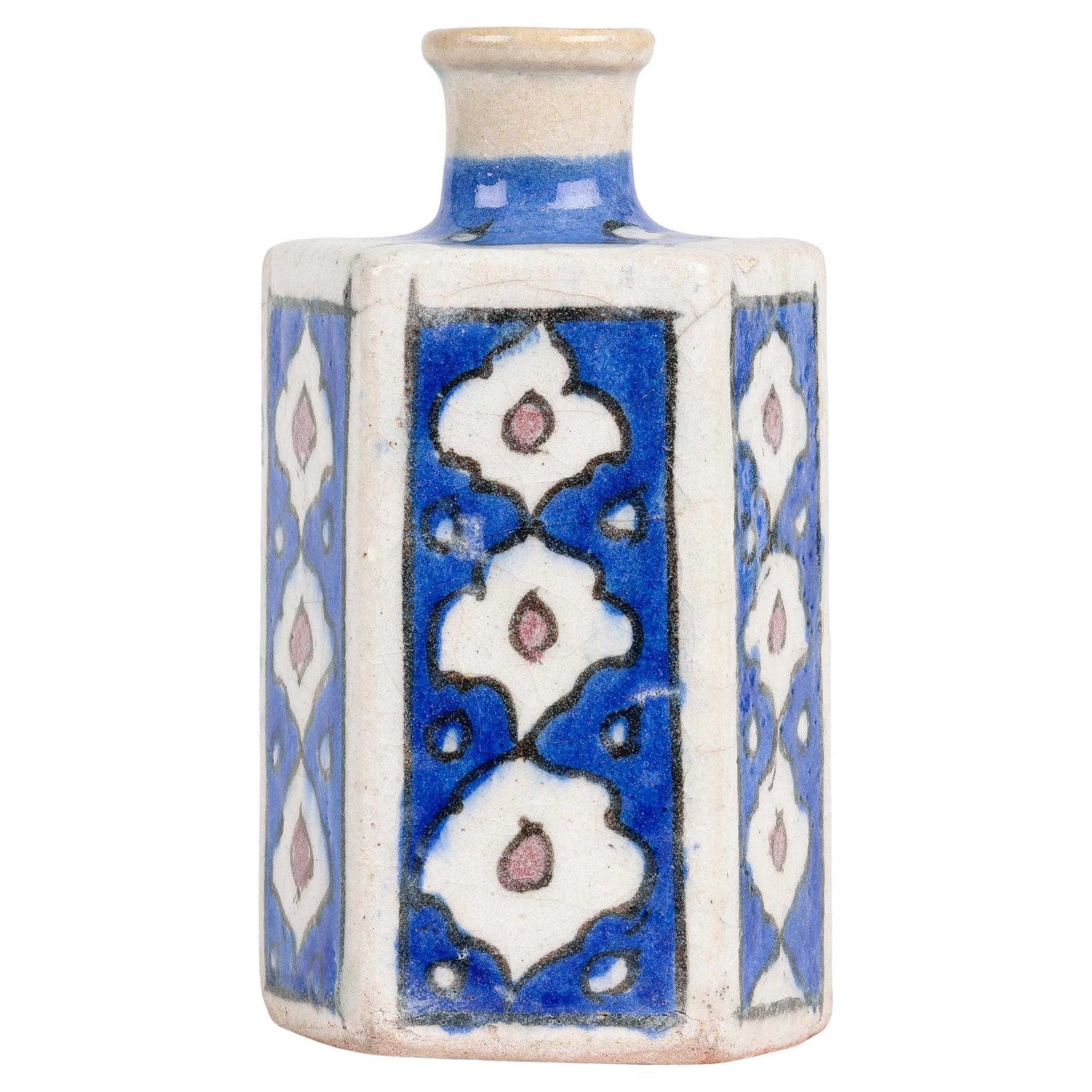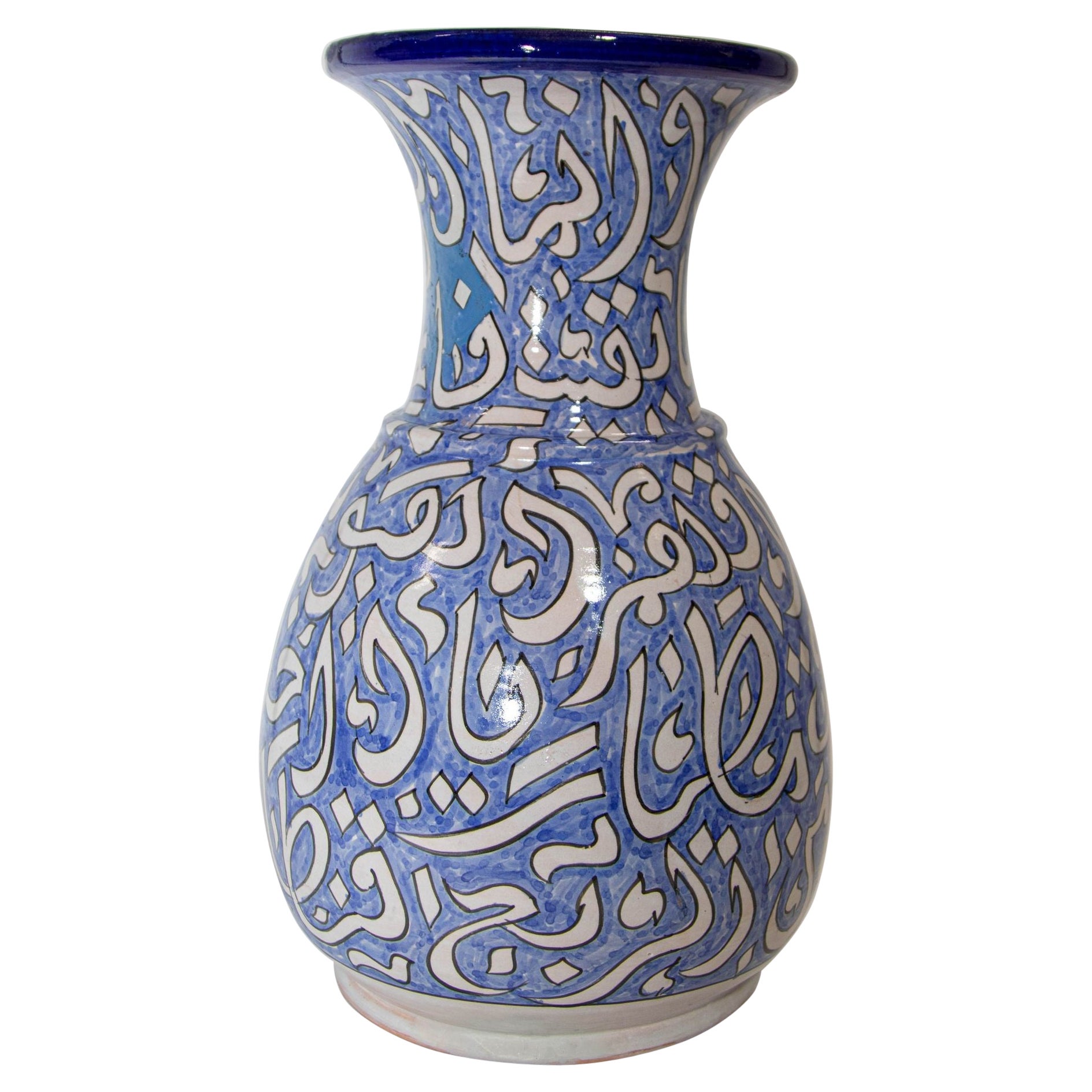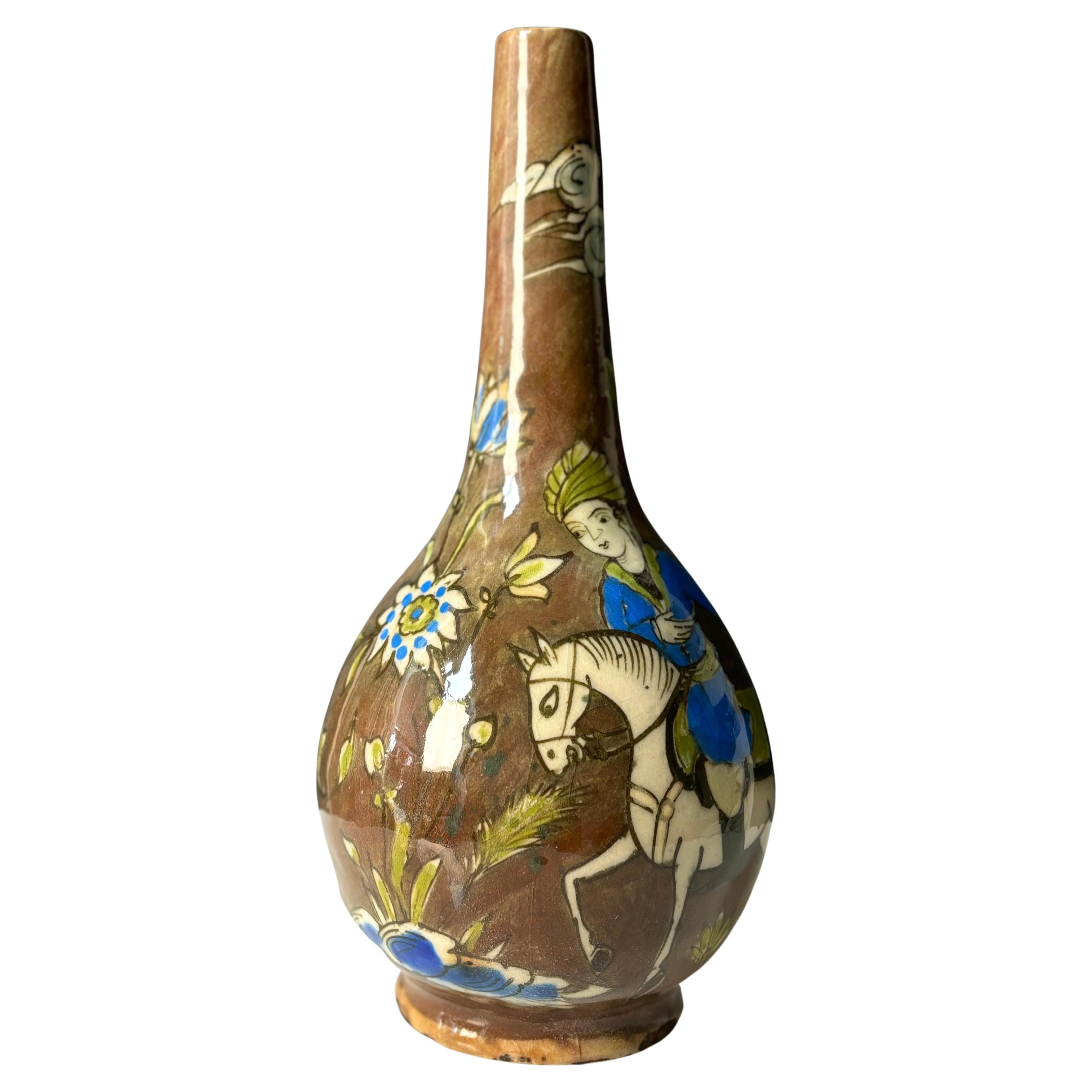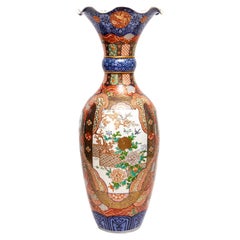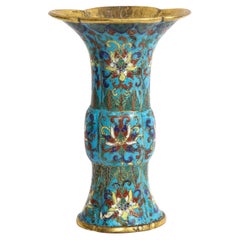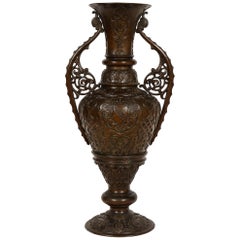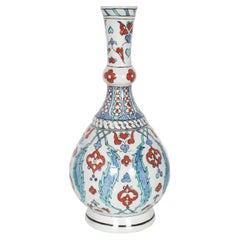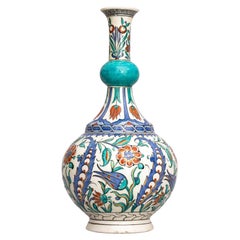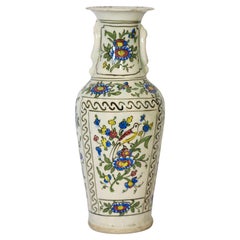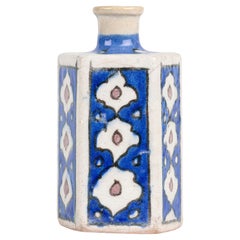Items Similar to Large Theodore Deck Earthenware Bottle Form Vase in the Islamic/Iznik Taste
Want more images or videos?
Request additional images or videos from the seller
1 of 9
Large Theodore Deck Earthenware Bottle Form Vase in the Islamic/Iznik Taste
$19,500
£14,813.44
€17,057.58
CA$27,896.72
A$30,600.01
CHF 15,779.27
MX$365,486.71
NOK 200,129.20
SEK 187,743.90
DKK 127,471.03
About the Item
A large and impressive Theodore Deck Earthenware bottle form vase in the Islamic/Iznik Taste, Impressed "TD" 1870 on the bottom. The narrow circular neck is decorated with dark blue, white and turquoise bands, the ovoid body is decorated with scrolling foliage and Islamic style chrysanthemum flowers in turquoise and dark blue hand-painted colors.
France, Circa: 1870
Reference: The Peter Marino Collection, Theodore Deck, Page 79.
Joseph-Théodore Deck was born in 1823 in Guebwiller in Alsace. He dreamed to become a sculptor but his humble origins oriented him towards a more prosaic profession: ceramic potter. He learned the technique of ceramics as a manufacturer of covered ovens with ceramic tiles and traveled to Germany, Hungary and Austria to improve his skills. At the age of 24, he moved to Paris to practice his art and worked in a factory that made ceramic kilns. He opened his own earthenware workshop in 1856 with his brother and his nephew and specialized in the oriental style and more particularly in the Iznik style. In the 1880s he explored the Chinese tradition and collaborated with Raphaël Collin, an academic painter professor at the Academy of Fine Arts recognized for the links he forged between French art and Japanese art both in painting. and ceramic. He published a treatise on the art of earthenware in 1887.He died in Paris in 1891.
Deck's contemporary sculptors and painters made frequent visits to the Deck workshop, which thus became an experimental laboratory to promote ceramics as an art and no longer simply as an industrial application. It was while attending the National Porcelain Museum in Sèvres that Deck studied Islamic art. Deck discovered that the brilliance of oriental ceramics was due to an alkaline base containing tin oxide. The decorations are covered with a transparent coating which produces a shiny and translucent effect. After many trials and experiments, Deck succeeded in perfecting this technique and created Deck Blue, his famous turquoise-blue using potash, soda ash and chalk. Deck presented his first collection of louvered earthenware at the Paris Exhibition of 1861 but it was at the London Exhibition of 1862 that he was officially recognized as an artist when the Victoria and Albert Museum bought three of his works. . He received a silver medal at the Universal Exhibition of 1867. Deck copied many Iznik ceramics but also created his own variations around the oriental theme by assembling various patterns on a single work.
- Creator:Theodore Deck (Maker)
- Dimensions:Height: 20 in (50.8 cm)Diameter: 11 in (27.94 cm)
- Style:Islamic (In the Style Of)
- Materials and Techniques:
- Place of Origin:
- Period:
- Date of Manufacture:1870
- Condition:Wear consistent with age and use.
- Seller Location:New York, NY
- Reference Number:1stDibs: LU919520290132
About the Seller
4.9
Platinum Seller
Premium sellers with a 4.7+ rating and 24-hour response times
Established in 1820
1stDibs seller since 2011
195 sales on 1stDibs
Typical response time: 1 hour
- ShippingRetrieving quote...Shipping from: New York, NY
- Return Policy
Authenticity Guarantee
In the unlikely event there’s an issue with an item’s authenticity, contact us within 1 year for a full refund. DetailsMoney-Back Guarantee
If your item is not as described, is damaged in transit, or does not arrive, contact us within 7 days for a full refund. Details24-Hour Cancellation
You have a 24-hour grace period in which to reconsider your purchase, with no questions asked.Vetted Professional Sellers
Our world-class sellers must adhere to strict standards for service and quality, maintaining the integrity of our listings.Price-Match Guarantee
If you find that a seller listed the same item for a lower price elsewhere, we’ll match it.Trusted Global Delivery
Our best-in-class carrier network provides specialized shipping options worldwide, including custom delivery.More From This Seller
View AllVery Large 19th Century Japanese Imari Porcelain Vase with Scalloped Top
Located in New York, NY
A Very Large 19th Century Japanese Imari Porcelain Vase with Scalloped Top.
The body of the vase is complete with two main cartouches and two smaller cartouches which flank the vase...
Category
Antique 1880s Japanese Japonisme Vases
Materials
Porcelain
Antique Chinese Cloisonné Enamel Gu Form Vase, 17th/18th Century, Kangxi Period
Located in New York, NY
A Fantastic, rare, and antique Chinese Cloisonné Enamel Gu Form vase, 17th/18th century, Kangxi Period. This cloisonne vase is extremely rare to find in this quality, condition, age,...
Category
Antique Late 17th Century Chinese Qing Metalwork
Materials
Bronze
19th C. French Islamic Champleve Enamel Vase and Underplate, Signed Barbedienne
By Ferdinand Barbedienne
Located in New York, NY
A Fantastic 19th century French Islamic/Orientalist Style Champleve Enamel Vase and Underplate, Signed F. Barbedienne. The wide-mouthed vase terminates down a narrowing body and is m...
Category
Antique 1850s French Islamic Vases
Materials
Bronze, Enamel
Large Patinated Bronze Alhambra Islamic Vase Made for the Islamic Market
Located in New York, NY
Large French patinated bronze Alhambra Islamic vase made for the Islamic market, beautifully hand chiselled and detailed with openwork Bronze handles, the central medallion with Isla...
Category
Antique 1870s French Islamic Vases
Materials
Bronze
Pair of French Porcelain Moon Flask Vases, for the Islamic/Moorish Market
Located in New York, NY
A beautiful pair of French Porcelain Moon flask vases, made for the Islamic/Moorish Market. Each vase has a moon flask form with a gorgeous turquoise ground. The hand-painted enamels...
Category
Antique 1890s French Islamic Vases
Materials
Porcelain
Fine Pair of Chinese Porcelain Bottle Shaped Vases, Daoguang period (1821-1850)
Located in New York, NY
A fine pair of Chinese porcelain bottle-shaped vases, painted in the Islamic style, Daoguang period (1821-1850). Each vase finely handpainted in Henn...
Category
Antique Mid-19th Century Chinese Chinese Export Ceramics
Materials
Porcelain
You May Also Like
Antique 18th Century Ottoman Islamic Iznik Kutahya Pottery Bottle Vase Surahi
Located in Portland, OR
A good antique 18th century Iznik Kutahya pottery "Surahi" or water bottle, Turkey, circa 1720.
The body raised on a circular slightly flraed foot rising to a baluster shaped body ri...
Category
Antique Early 18th Century Turkish Islamic Ceramics
Materials
Pottery
Late 19th-Century Iznik-Style Vase by Samson
By Edmé Samson
Located in Fort Lauderdale, FL
An Iznik-style vase made by Edmé Samson et Cie after a 16th-century Turkish bottle vase in the collection of the Musée d'Ecouen.
The vase’s bulbous body is decorated in a red, cobalt blue, turquoise, and green floral design of saz leaves, roses, and tulips. The neck is decorated with delicate floral sprays. The design is highlighted with gilding throughout, and is intentionally sparse around the turquoise area of the neck to mimic the wear of the 16th-century vase after which it was modelled. As with many other Samson Iznik...
Category
Antique Late 19th Century British Islamic Vases
Materials
Ceramic, Porcelain
Antique Ottoman Kutahya Turkish Vase with Iznik Design
Located in Moreno Valley, CA
Antique Kutahya Turkish Vase with Iznik Ottoman Islamic Design.
Antique Ottoman Turkish Kütahya Earthenware Vase.
Handmade Middle Eastern earthenware vas...
Category
Mid-20th Century Turkish Islamic Vases
Materials
Ceramic, Earthenware
Persian Hand Painted Five-Sided Bottle Shaped Earthenware Vase
Located in Bishop's Stortford, Hertfordshire
From a small collection of five Persian hand painted pottery vases is this stylish earthenware five-sided (Polygon shaped) bottle shaped vase hand painted with stylized leaf panel pa...
Category
Early 20th Century Qatari Islamic Ceramics
Materials
Earthenware, Pottery
Moroccan Glazed Ceramic Vase with Arabic Blue Writing from Fez Morocco
Located in Moreno Valley, CA
Large Moroccan glazed ceramic vase from Fez.
Moroccan Glazed Ceramic Vase with Arabic Blue Writing from Fez Morocco.
Moorish Granada style ceramic handcrafted and hand painted with A...
Category
Mid-20th Century Moroccan Islamic Vases
Materials
Ceramic
Antique Persian Qajar Dynasty Bottle Vase, 19th Century
By Iznik Pottery
Located in Copenhagen, DK
Large antique middle eastern Persian bottle vase with hand-painted organic decorations depicting people, animals and flowers in bright cobalt blue, whit...
Category
Antique Mid-19th Century Persian Islamic Vases
Materials
Ceramic, Clay, Pottery, Earthenware
More Ways To Browse
French Hand Painted Large Vase
Large Blue And White Chinese Vase
Blue And White Bottle Vase
Large Blue And White Chinese Porcelain Vase
Used Ceramic Kilns
Sevres Porcelain Vase With Cover
Large Earthenware Vases
Antique Oven
Oriental Ceramics
Iznik Antique
Antique Soda
Japanese Blue And White Bottle Vase
Japanese Vase Turquoise Hand Painted
Ceramics Iznik
Iznik Vase
Post Modern Ceramic Vase
Antique English Vase
French 1930 Vases
